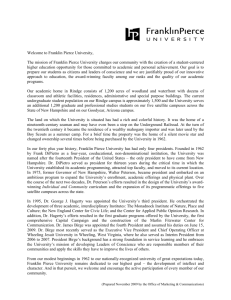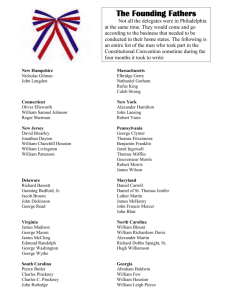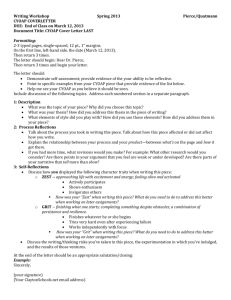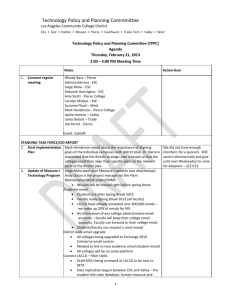The Life of Franklin Pierce - Franklin Pierce Bicentennial
advertisement
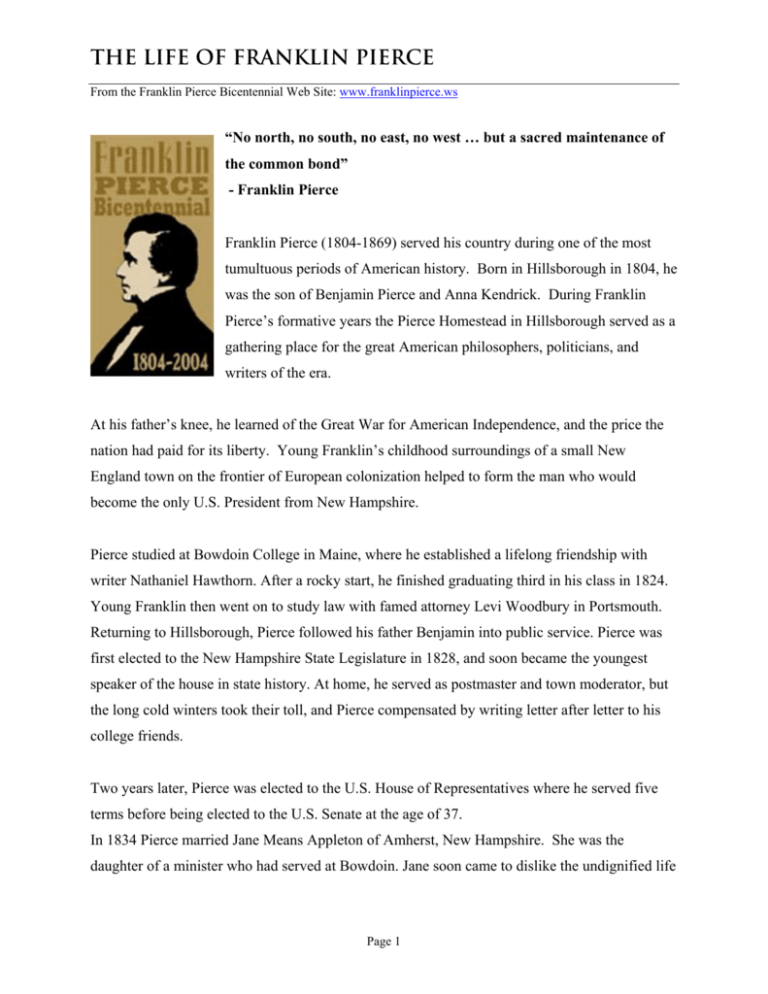
The Life of Franklin Pierce From the Franklin Pierce Bicentennial Web Site: www.franklinpierce.ws “No north, no south, no east, no west … but a sacred maintenance of the common bond” - Franklin Pierce Franklin Pierce (1804-1869) served his country during one of the most tumultuous periods of American history. Born in Hillsborough in 1804, he was the son of Benjamin Pierce and Anna Kendrick. During Franklin Pierce’s formative years the Pierce Homestead in Hillsborough served as a gathering place for the great American philosophers, politicians, and writers of the era. At his father’s knee, he learned of the Great War for American Independence, and the price the nation had paid for its liberty. Young Franklin’s childhood surroundings of a small New England town on the frontier of European colonization helped to form the man who would become the only U.S. President from New Hampshire. Pierce studied at Bowdoin College in Maine, where he established a lifelong friendship with writer Nathaniel Hawthorn. After a rocky start, he finished graduating third in his class in 1824. Young Franklin then went on to study law with famed attorney Levi Woodbury in Portsmouth. Returning to Hillsborough, Pierce followed his father Benjamin into public service. Pierce was first elected to the New Hampshire State Legislature in 1828, and soon became the youngest speaker of the house in state history. At home, he served as postmaster and town moderator, but the long cold winters took their toll, and Pierce compensated by writing letter after letter to his college friends. Two years later, Pierce was elected to the U.S. House of Representatives where he served five terms before being elected to the U.S. Senate at the age of 37. In 1834 Pierce married Jane Means Appleton of Amherst, New Hampshire. She was the daughter of a minister who had served at Bowdoin. Jane soon came to dislike the undignified life Page 1 The Life of Franklin Pierce From the Franklin Pierce Bicentennial Web Site: www.franklinpierce.ws of politicians in Washington, and after just four years in the Senate, Pierce retired to Concord to practice law. As an attorney Pierce gained fame and it was said that it would have been fair to have 12 lawyers oppose a man of such talent. But, it was behind the political scenes that he gained his real power. While Pierce refused both a nomination for Governor and a cabinet position from President Polk in 1846, he became the mastermind behind the New Hampshire Democratic Party, and little happened in the State without his approval. Franklin and Jane lived in a fine Manse not far from the city center. Their first child, Franklin Jr., born in 1836, lived only three days. Their second son, Franky, born three years later, would die in 1843 of typhus. Bennie, the Pierces’third son was born in 1841. Finally, the Mexican War would stir Pierce to leave his private life. After enlisting in the army as a private, he was quickly promoted to Colonel, and then to General. He was injured in battle, and his enemies would accuse him of cowardice. Pierce was again called to serve his country in 1852, during a deadlock on the floor of the Democratic Convention. None of the four candidates, including James Buchanan and Stephen A. Douglas, could win enough votes to gain the presidential nomination. After 34 ballots, delegates from Virginia introduced Franklin Pierce’s name in hopes of breaking the deadlock. The Convention quickly embraced the nomination, which Pierce quietly accepted without ever having campaigned. Some said that he had orchestrated the whole thing. Pierce was out for a carriage ride with his wife when he heard the news. Jane quickly fainted. The election of 1852 focused on few issues, for it was believed that the Compromise of 1850 had settled the question of slavery. While Pierce favored the Compromise, it was his support of the Fugitive Slave Law and his pro-slavery vice president William King that won him the South’s votes. He had an impressive electoral victory over his former commanding officer and the last Whigg candidate for President, Winfield Scott. Page 2 The Life of Franklin Pierce From the Franklin Pierce Bicentennial Web Site: www.franklinpierce.ws At age 48 Franklin Pierce was the youngest President yet elected. As President-elect Pierce was travelling home with his family a few months later, when their train jumped the tracks. Young Bennie was killed before his parents’eyes in the accident. So grieved was Jane Pierce that she was not seen in public for the next two years and refused to attend her husband’s inauguration. There would be no inaugural ball. Jane would become known as the “Shadow of the White House.” Jane would say that God had removed an impediment to help her husband govern. Indeed, Bennie’s death cast a shadow over Pierce himself, as he went on to face the problems that divided his nation. But, in due time she would emerge to attend Congressional hearings on slavery, and was soon identified with the Abolitionist cause. In the South fears were high that the western territories would enter the Union as “free”states, giving the North a political advantage. In the North, hatred against European immigrants flared as Pierce defended their rights under the Constitution. But, it was the Kansas-Nebraska Act of 1854, which allowed western settlers to choose whether to allow slavery that would shatter the nation’s stability. Pierce stood by his party’s extreme pro-slavery line and supported the bill. The result was a rush of both sides to Kansas, where a bloody armed conflict soon erupted. Pierce appointed pro-slavery governor after pro-slavery governor, but the only result was a stronger abolition movement. Pierce refused to change his outlook, as he had said in his inaugural address: “You have a right to expect your agents in every department to regard strictly the limits imposed upon them by the Constitution of the United States.” With his brutal enforcement of the Fugitive Slave Act in Boston, Pierce brought the horror of slavery to the forefront. With public opinion turning against him, Pierce saw that he could not run for a second term, and left for several years in Madeira and continental Europe shortly after his term ended. Pierce was a manager who worked behind the scenes to make things happen. And his tenure had seen economic growth and expansion, including the Gadsden Purchase of 1853 and the ratification of the first commercial treaty with Japan. Yet, Pierce’s unwavering support of slavery Page 3 The Life of Franklin Pierce From the Franklin Pierce Bicentennial Web Site: www.franklinpierce.ws only intensified a national rift that would end in Civil War. Much of the blame for that war would be laid at his feet. He had left New Hampshire a hero in 1853. He returned in silence. Franklin Pierce died at Concord on October 8, 1869, five years after his wife, Jane. In an early speech Pierce made it clear that in the face of turmoil, he would not abandon his fervent belief in the Constitution, and his desire to preserve the Union, despite the consequences. “Some men are so constituted that they do not incline to bend before a storm.” Page 4
